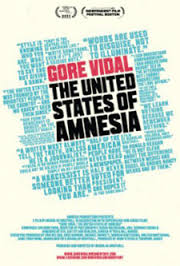
GORE VIDAL: THE UNITED STATES OF AMNESIA
US, 2012, 83 minutes, Colour and Black and white.
Gore Vidal,
Directed by Nicholas Wrathall.
Certainly an offbeat title. And the premise of the plot is rather suspect, though treated more gently than might be expected.
We are introduced to two characters, one in his middle age, the other older. They are played by John Turturro and Woody Allen.
Fioravante (Turturro) is a quiet character, who works in a flower shop and is an expert as at floral designs. He is helping his friend, Murray, packing up books because people are less interested in books these days. Murray has visited his doctor for a dermatology procedure and the issue has come up about sex, relationships and a menage and Murray has the bright idea that his friend, Fioravante, might respond to such requests and start a career as a gigolo. Murray is eager to be his agent – and even more eager not only to have an agent’s fee but, as waitresses do in restaurants, share tips.
This might not be the story an audience would like to watch – but, it is treated with more humanity than might have been expected, raises issues of sexuality and relationships, and does so with some humour.
There is little given about Fioravante’s background or why he should agree to take on this role. Seeing him with a number of clients shows his sympathy, kindness and regard for women. One is played by Sharon Stone, initially shy, but wanting revenge on her husband. Another is played by Sofia Vergara, who is in for the experience. But one woman he encounters is a widow from the strict Jewish community in Brooklyn, who stirs emotions in him as well as in herself.
It should have been said earlier, that the role of Murray is very much a typical Woody Allen character, full of anxious remarks, full of one-liners, keeping the audience very much amused with his worrying character and his style. And suddenly it is revealed that he has an African-American? wife and several children with whom he is a tender father.
This brings in the Jewish community, very strict in its regulations, Murray not fitting into their ideals. Liev Schreiber is one of the local equivalent of police, keeping an eye on everyone’s behaviour, even to arresting people and bringing them before a bench of Rabbis for judgement.
This means that there is a lot of comedy about groups in New York City, humour about this Jewish community, for instance, serious young Rabbis-in-the-making, refusing to be interested in or coached in baseball – but some relent!
The screenplay was written by John Turturro, who also directs, so it is a vehicle for himself, his character, his moral behaviour, his concerns, the experience of being a local gigolo and its repercussions for himself and his moral perspective.
A different New York story.
1. A portrait of Gore Vidal? As a person, as a celebrity, influence in the United States, literature, theatre, cinema, politics, culture and style?
2. The structure of the film: the decades of Vidal’s life, the decades of American history, from the 1920s to 2010? The quotes from Vidal throughout the film, wise, aphorisms, witticisms?
3. The use of footage of Vidal, his life and career, public life, private life, television interviews? The footage for the different periods and American history and politics?
4. Vidal, aristocratic background, his father and politics, his private school education, serving in the Navy, beginning to write novels, about the war, the homosexual novel and its impact? Writing screenplays? His bid for the Senate in 1960? Involvement in politics and commentary> television discussions with William Buckley? His acerbic tone? His writing the history of the United States in novels? Moving to Italy, the beauty of his home on the coast on the cliff? His life there? His partner and his views on sexuality, active, platonic? his range of friends, in society, the locals and the staff? The death of his partner? The funeral and the grave? Vidal’s illness, having to leave, the farewells and the affection for the people in Italy? Living in the US? public appearances? Living into the Obama era?
5. The picture of American history, the 20s in the aftermath of World War I, the jazz age, wealthy families? In politics? The 1930s, the world of education? The 1940s, war, Navy action, post-war America, difficulties for those returning from war? The 1950s, Vidal and his literature, theatre, his novels? The quiet of the Eisenhower era? The 1960s, John F. Kennedy and the personal contacts, with Jackie Kennedy and the family connections? The campaign? Vidal’s own campaign and its failure? The omission of Nixon and Lyndon Johnson? The Vietnam war and Vidal’s opposition to it? The 1970s, divisions in the United States, the war and the aftermath of the war? The 1980s, Vidal and his comments on Reagan, as an actor, personality, politician? The later decades and little on the Bush administrations and Bill Clinton? Into the 21st century, his response to President’s Obama’s election?
6. The quotations, the ideas, the sharp responses? The coverage of his novels? The particular emphasis on Myra Breckenridge in the film? The film of The Best Man and its revival in the 21st century, its continued relevance?
7. The film as an American experience?